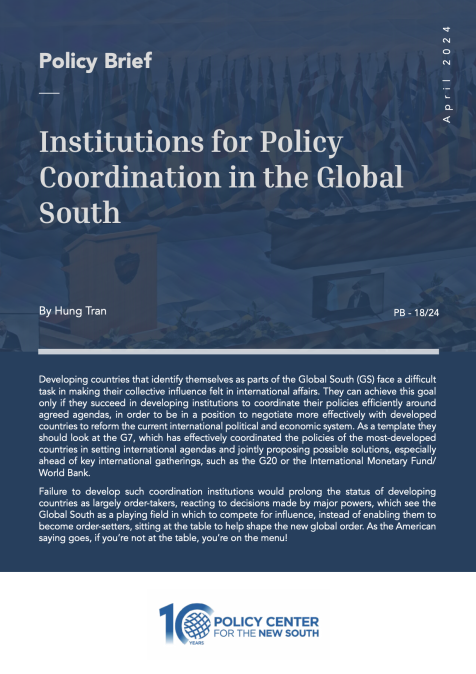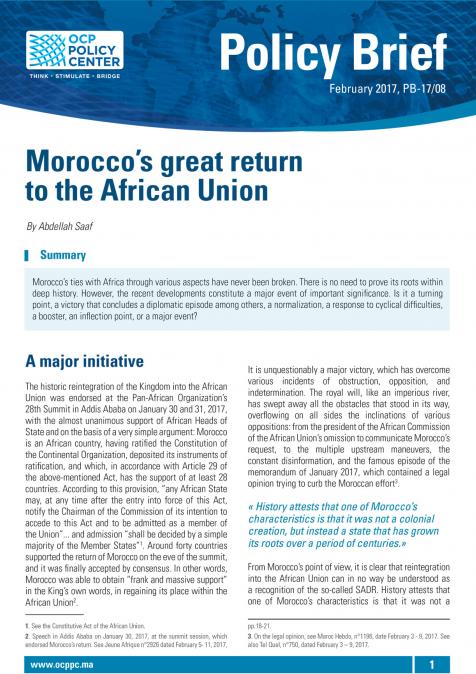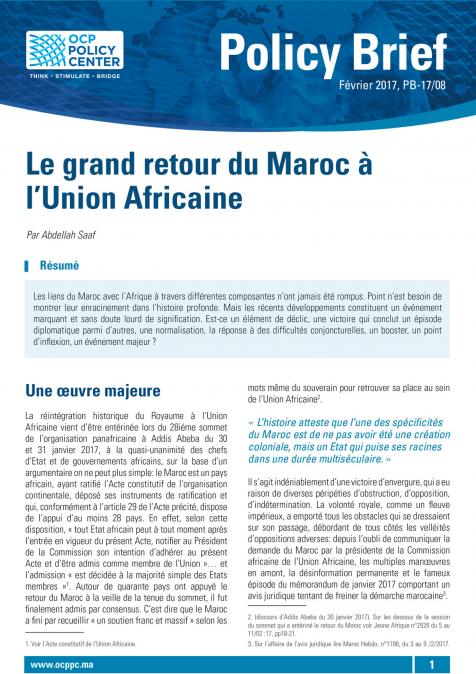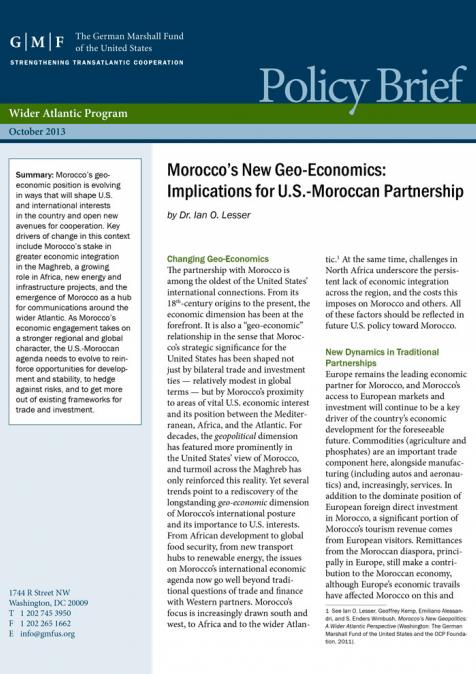Publications /
Policy Brief
Developing countries that identify themselves as parts of the Global South (GS) face a difficult task in making their collective influence felt in international affairs. They can achieve this goal only if they succeed in developing institutions to coordinate their policies efficiently around agreed agendas, in order to be in a position to negotiate more effectively with developed countries to reform the current international political and economic system. As a template they should look at the G7, which has effectively coordinated the policies of the most-developed countries in setting international agendas and jointly proposing possible solutions, especially ahead of key international gatherings, such as the G20 or the International Monetary Fund/ World Bank.
Failure to develop such coordination institutions would prolong the status of developing countries as largely order-takers, reacting to decisions made by major powers, which see the Global South as a playing field in which to compete for influence, instead of enabling them to become order-setters, sitting at the table to help shape the new global order. As the American saying goes, if you’re not at the table, you’re on the menu!
The BRICS-10
The BRICS—originally a group of countries established in 2009 to bring together Brazil, Russia, India, and China, and adding South Africa in 2010—has been expanded to ten members since the beginning of 2024 by including Saudi Arabia, the United Arab Emirates, Iran, Egypt, and Ethiopia. Public reaction to this event has been divided. Some view the BRICS-10 as a competitor to the G7, that could even replace it as the body setting agendas for the international community. Others continue to dismiss the group as a talking shop, riven by internal differences which prevent it from being be able to coordinate policies effectively within the group, let alone on behalf of the GS.
Neither of those extreme views is likely to be totally correct. The BRICS-10 could be expected to become a counterpart to the G7 in international fora like the G20, coordinating and representing GS and developed countries respectively. It is not yet in a position to do so, but it has already had an impact on the dynamics of changes in the current global political and economic system. It is important not to underestimate the significance of the expansion of BRICS to BRICS-10. The new grouping accounts for 41% of the world population, 29% of world GDP at market rates (still smaller than 43% for the G7), 47% of global oil production, but only 19.3% of the voting power at the World Bank (compared to 39.7% for the G7). As a result, any consensus decisions by the group would have international ramifications.
More importantly, the original BRICS has launched several initiatives which have excluded Western countries. These have taken shape over the past decade, ready to be invigorated by the infusion of new blood. These initiatives will be increasingly useful to members, helping to underpin the allure of the group to other GS countries.
Firstly, the BRICS established the New Development Bank (NDB) in 2015, with an authorized capital of $100 billion, and a mandate to finance development projects consistent with members’ strategies and priorities. Importantly, the NDB has aimed to raise funds and provide loans in local currencies, with a target of 30% of its portfolios in local currencies in the foreseeable future. The inclusion of deep-pocketed Saudi Arabia and the UAE could significantly increase the NDB’s financial resources, thus attracting more countries into the grouping. At present, beyond the ten BRICS members, the NDB also includes Bangladesh and Uruguay, with a long list of countries waiting in the wings. The NDB is still small compared to the Asian Infrastructure Investment Bank (AIIB) launched around the same time at China’s initiative, let alone established multilateral development banks (MDBs) such as the World Bank and its sister regional banks. However, by dovetailing its lending with members’ development needs and priorities without onerous conditionality (as perceived by the borrowers), the NDB hopes to offer an alternative template for development aid—helping developing countries negotiate better deals with the established MDBs.
Secondly, the BRICS has launched the Contingent Reserves Arrangement (CRA), pooling reserves from members totaling $100 billion to provide liquidity support to members in balance-of-payments crises. The BRICS-10 would boost the volume of pooled reserves especially with Saudi Arabia and UAE, and could be useful to new members such as Ethiopia, Egypt, and Iran. Again several other countries have expressed an interest in joining the CRA.
Last but not least, the BRICS has agreed to coordinate payment policies and to develop infrastructures to facilitate the use of local currencies in settling trade and investment transactions between themselves, without relying on the dollar as a vehicle currency. This is the goal of the BRICS Pay project to reduce members’ dependence on the dollar, which is viewed as being increasingly used by the U.S. in financial sanctions to serve its national strategic interests.
Specifically, most BRICS member countries have taken steps to develop national interbank payment and settlement systems—which are beneficial in themselves to these economies, but even more useful to the group if done in ways that can link them to each other, or make them interoperable. China launched its Cross-border interbank payment system (CIPS) in 2015, combining SWIFT-like financial messaging with real-time gross settlement of transactions (similar to CHIPS in the US). CIPS has grown quickly to have 1482 participants in 123 countries, mostly in Asia, able to processed 80% of China’s renminbi cross-border transactions, worth $5.46 trillion in the first three quarters of 2023.
Russia has developed its System for the Transfer of Financial Messages (STFM) and the Faster Payment System (FPS) operated by the Central Bank of Russia, which has reported that 20 countries have participated in the FPS.
India’s National Payments Corporation has introduced its Unified Payment Interface (UPI) to settle interbank transactions. This has been used to process bilateral cross-border transactions in local currencies in the South Asian region.
More recently, Brazil developed its PIX payment system in 2020, operating in Latin America.
Linking the national payment systems together, plus currency swap arrangements between BRICS central banks, has facilitated receipts and payments of exporters and importers in their respective local currencies. The most notable progress has been in bilateral trade between Russia and China, with reportedly 95% of the 2023 trade volume of more than $220 billion settled in Russia’s ruble and China’s yuan. Similar uses of local currencies to settle bilateral trades have also been reported for other BRICS members. Moreover, the RMB has been highlighted as being used by third countries in several cases. For example, Russia has reportedly been able to use the RMB in trades with a range of countries, including Mongolia, the Philippines, Malaysia, the UAE, Thailand, Japan, Tajikistan, and Singapore.
Cross-border transactions will be greatly facilitated if those local currencies are developed in tokenized form, such as stablecoins or central bank digital currencies (CBDCs)—a project pursued by most central banks around the world.
Strategically, by sharing local currency payment technical knowhow and experience, the BRICS+10 can play an important role in promoting the dedollarization efforts undertaken by many other GS countries—and in the process building alternatives to the dollar-based international payment system, to reduce reliance on the dollar but not necessarily to replace it as the premier currency in the current system.
In short, the concrete initiatives described above are likely to progress further, with fresh momentum supplied by the five new BRICS members. Those initiatives have provided some practical benefits to member countries, which could become more substantive in future, serving as anchors to sustain the group and attract new members.
Internal Problems of the BRICS-10
However, the BRICS-10 will have to overcome difficulties in trying to coordinate policies beyond those projects, both between themselves and on behalf of the broader GS. In particular, since major G20 member countries such as Indonesia and Turkey are not part of the BRICS-10, it is not clear how much the group can coordinate policies among GS members to prepare for G20 meetings, as the G7 does for developed countries. The same problem remains with the group’s vision of coordinating policies at the United Nations and UN Security Council, as well as in efforts to reform those institutions.
To begin with, as the group operates by consensus, it will be more difficult to do so with ten members instead of five.
More importantly, the BRICS-10 consists of countries including China, Russia, and Iran, that form what The Economist called “a thriving anti-Western axis”, which would color the way the West is prepared to deal with the group. These three countries are ready to adopt a more confrontational approach toward the West, possibly pitching them against more moderate BRICS members, such as India and Brazil, which favor a more cooperative approach. Indeed, there have been sub-groups formed by members to discuss various issues of interest to them. For example, the India-Brazil-South Africa Forum (IBSA) was started in 2003 to discuss global governance reform, World Trade Organization negotiations and climate change. In 2009, BASIC was launched by Brazil, South Africa, India, and China, to discuss climate change issues in line with the G77. On balance, it remains to be seen how the BRICS-10 can navigate this fundamental fault line and become an effective forum to coordinate policies of member countries on a broad range of issues reflecting the interests of the GS in general.
Moreover, differences and potential conflicts between members make reaching a consensus more difficult. For example, there are disagreements between China and India over territorial issues and competition for regional influence. Saudi Arabia, the UAE, and Iran are in competition for regional influence in the Middle East. Egypt and Ethiopia argue over the Nile’s water resources. Even Russia and China, despite a declaration that they are “best friends forever”, have a history of territorial clashes and competition for influence.
These differences may prevent the group from reacting quickly to important geopolitical issues, especially where their strategic interests diverge. This fundamental problem will become even more challenging as the group expands—being pushed by China and Russia. At present, reportedly, 34 countries have actually “submitted an expression of interest to join the group”, with more waiting in the wings.
The NAM and G77
The Asian African Conference in Bandung, Indonesia in 1955 marked the beginning of the Non-Aligned Movement (NAM), bringing together developing countries that were not keen to side with the U.S. or the Soviet Union during the Cold War. Starting with 29 members, the NAM has found a new relevance with the geopolitical rivalry between the U.S. and China, growing to 120 at present, with 17 observer countries, including China which applied to become one in 1992. The chairmanship of the NAM rotates every three years, and a troika (past, present and future chairs) works to provide continuity to the group. At UN Plenary meetings, the NAM coordinates issues pertaining to the first committee (disarmament, international security), fourth committee (decolonization), sixth committee (legal), and some issues in the third committee (social, humanitarian, and cultural).
Parallel to the NAM, at the UN, the Group of 77 developing countries (G77) organized themselves in 1964 to coordinate positions to increase their influence over UN agendas. The G77 has grown to 134 members, with China saying that it is not a member but fully supporting the G77 goals. This has led to the awkward label of “the Group of 77 plus China , often acting as a group in UN fora. At UN plenary meetings, the G77 coordinates issues under the purview of the second committee (economic and financial), fifth committee (administration and budget), and some parts of the third committee (social, humanitarian, and cultural). Given its broad membership, the group can claim to represent the Global South. By the same argument, however, it is difficult to arrive expeditiously at common views, except for on general issues.
A Joint Coordination Committee (JCC) provides coordination and harmonization for both the NAM and G77. However, it is not clear how useful the JCC has been.
The G77 is organized into chapters, with liaison offices at the UN (New York and Geneva) and some of its affiliated organizations, such as UNESCO in Paris, UNIDO in Vienna, UNEP in Nairobi, and the FAO in Rome.
The G77+China can be effective on certain issues. For example, under the chairmanship of Cuba, the group was successful in fighting for its common platform at the COP28 in Dubai in 2023—getting the developed countries to accept responsibility for emitting greenhouse gases causing climate change, and to provide the bulk of finance to deal with the climate mitigation and transition problem, including through contributions to a loss and damage fund. Uganda has taken over the group’s chairmanship for 2024.
At the IMF and World Bank, developing countries are represented by the G24, which enjoys funding and staffing support from the two institutions. The G24 can articulate the views of developing countries in the debate about reform of the Bretton Woods institutions. For example, at the 2023 IMF/WB annual meetings in Marrakech, Morocco, the G24 was active in arguing that quota increase without reform, to redistribute relative voting shares of members to better reflect the growing weight of developing countries, is not good enough. It has circulated proposals to reform the quota formula and distribution.
However, the G77 has been conspicuous by its absence at the G20 and the WTO ,which is going through important reform discussions. These shortcomings need to be fixed. In particular, the JCC needs to be empowered with clear mandates and adequate resources to provide more effective policy coordination for the NAM/G-77. Without a significant strengthening of members’ willingness to cooperate in policy coordination, the G77 will remain limited in its ability to sit at the table to help shape the new world order.
Ad-hoc Coalition Building
Ranked below major countries, such as China or Russia (mostly in military matters), in terms of global influence, several GS countries have the weight in terms of population size, economic scale and growth, natural resources, and strategic geographical location, to have credibility in launching specific initiatives. Referred to as ‘middle power’ countries, they have used certain specific occasions to rally support from fellow GS countries to promote their concrete agendas. Such ad-hoc coalition building can be easier to pull off as it poses less-formidable coordination problems—other countries feel they can lend support to a specific cause without being bound by many other considerations. The support given to the initiating country confers a degree of credibility and stature important for it to press its cause relative to developed countries and others in the international arena.
Recently there have been several examples of successful ad-hoc coalition building.
In January 2023, at the beginning of its program of activities during its G20 Presidency, India organized a virtual global summit of leaders of the GS to canvas their views, which India then incorporated into the G20 agenda. That was done to buttress India’s claim to be the voice of the GS—in competition with China. This was clear in the fact that India did not invite China to that virtual summit, on the ground that China is not part of the GS. The successful conclusion of the 2023 G20 Summit, with a joint Communiqué incorporating major concerns of the GS, has reflected well on India.
In a similar vein, Brazil aims to use its Presidency of this year’s G20 to promote global governance reforms, including of the UN system and the Bretton Woods institutions, as well as to tackle global hunger and poverty problems, by bringing more developing countries to the table. Such an approach would be embraced by many GS countries. More importantly, Brazil plans a series of initiatives in partnership with others during the G20 program of meetings, leading up to the G20 Summit in November 2024. These include a Task Force for the Global Mobilization Against Climate Change to spur the world’s green transition efforts, the Global Bioeconomy Initiative (aiming among other things to expand developing countries’ access to various and fragmented climate funds), the Global Alliance Against Hunger and Poverty (as a tool for reaching the UN Sustainable Development Goals by 2030), a global initiative to impose a minimum tax on the super rich, which France has endorsed, and a Partnership for Workers’ Rights (in particular in the gig economy, spearheaded by Brazil and the U.S.). When adopted, and more importantly kept going, by Brazil and its partners, these initiatives would represent serious contributions by the GS to the global reform agenda.
On January 10, 2024 South Africa initiated proceedings against Israel in the International Court of Justice for its alleged crime of genocide against the Palestinian people in Gaza, in the wake of the Hamas attack on October 7, 2023. While being opposed by many developed countries, the court case brought by South Africa has galvanized the support of many GS countries, coalescing into a fairly unified stand of the GS on an important international issue.
At the WTO’s Ministerial Conference 13 (MC13), in Abu Dhabi in February 2024, which discussed the reform of the organization among other issues, India, Brazil, Indonesia, South Africa, and others in the Cairns Group of agricultural exporting countries, blocked progress on many issues until appropriate changes are made in the trading rules for agricultural products—which those countries claim would help them develop their economies. India spearheaded a group of developing countries called the G33, pushing for a permanent solution to stockholding for food-security purposes. Interestingly, India and South Africa objected to a China-led Facilitation of Investment for Development Agreement, arguing that it is outside of the WTO mandate.
Another example has been set by Indonesia, which has launched a national plan to mobilize $545 billion between now and 2040 to develop its economy by using its plentiful natural resources, including nickel and palm oil, and its strategic Asia-Pacific location, to attract foreign investment, conditional on helping the country develop downstream activities—refining, processing, and manufacturing—instead of relying only on extraction, as in the past. This approach has shown promise, especially with Chinese FDI pouring in, forcing the West to compete for market shares. Against the backdrop of a global competitive race to secure access to strategic minerals, other resources-rich countries can make use of Indonesia’s experiences to formulate their own development plans—eventually promoting a new paradigm in FDI flows to GS countries. This can be a basis for Indonesia to reach out to other GS countries, especially in Africa.
Most recently, on March 6, 2024, the Presidents of Ghana, Kenya and Zambia jointly published an appeal in The Economist for a comprehensive overhaul of the global financial architecture, and for institutions to mobilize capital to “help Africa help itself… by looking within for solutions”. An interesting idea is to strengthen institutions to help international investors assign proper valuations to many assets hidden on their sovereign balance sheets. For example, proper legal titles to protect property rights and their tradability can significantly increase land values, generating capital for investment. Proposals articulated by leaders like this appeal can serve as rallying points for other countries to work together to reform the current international financial system.
The Growing Role of Think Tanks in the Global South
In recent years, think tanks in various GS countries have grown in number and gained attention internationally and regionally. Several have been included in the list of top think tanks worldwide, compiled by the University of Pennsylvania. These include, for example, Fundacao Getulio Vargas (FGV) in Brazil, the China Institute of Contemporary International Relations (CICIR) in China, the Observer Research Foundation (ORF) in India, the African Center for the Constructive Resolution of Disputes (ACCORD) in South Africa, the Institute of World Economy and International Relations (IMEMO) in Russia, and the Al-Ahram Center for Political and Strategic Studies in Egypt. Several others have been mentioned as having gained regional influence, including the Policy Center for the New South in Morocco, and the Center for Strategic and International Studies (CSIS) in Indonesia.
Like their counterparts in developed countries, think tanks in the GS respond to the needs of policymakers and societies at large, for reliable information, in-depth analyses, and well-reasoned policy considerations and proposals in an increasingly interconnected world that is faced with unprecedented and complex problems. By collaborating with each other, GS think tanks can help fill the gap in policy coordination among developing countries—especially by presenting joint analyses of the costs and benefits of different policy scenarios.
GS think tanks have made good efforts in this direction. In particular, they have worked together under the banner of the T20, driven by the country holding the annual presidency of the G20—Indonesia in 2022, India in 2023, Brazil this year, and South Africa in 2025. Think tanks can help advance the views and positions of GS countries, engaging more efficiently with developed countries on pressing issues on the G20 agenda.
Conclusions
On balance, while the sentiment of solidarity among GS countries has grown, the institutions for effective coordination of policies to present unified positions in negotiations with advanced countries are not well developed. Institutions such as the BRICS-10, NAM, and G77+China have proved useful in specific cases, but they still have to overcome major internal impediments to be able to function as efficiently and reliably as their counterparts in the developed world. In the meantime, while addressing the need to enhance the cohesiveness of those institutions, especially in strengthening the effectiveness of the JCC, GS countries, especially the ‘middle powers’, can be more active and astute in building ad-hoc coalitions to advance issues of strategic interest to them, making better use of their think tanks in the process. This would promote a more balanced and meaningful dialogue between GS and developed countries, in addressing the challenges facing the world.





